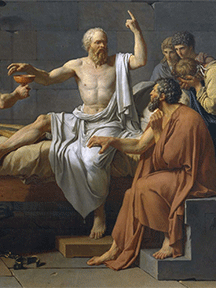By Samantha Smith
The act of self-examination, with its inherent certainty to produce more uncertainty, can be informed in the twenty-first century by the history of how philosophers have approached similar self-reflection.
James Miller’s book, Examined Lives: From Socrates to Nietzsche (Picador, 2012) is based on that premise and weaves the biographical details and theories of twelve philosophers: Socrates, Plato, Diogenes, Aristotle, Seneca, Augustine, Montaigne, Descartes, Rousseau, Kant, Emerson, and Nietzsche.
Miller traces his intellectual inspiration for Examined Lives from a comment Foucault made in a 1984 lecture at the Collège de France: “[I]t seems to me that it would be interesting to write a history starting from the problem of the philosophical life….” The result includes revelations on the philosophers’ varying attempts at self-reflection, which Miller said he reacted to with “…not just awe and admiration, but also pity; chagrin; and in a few instances, amused disbelief.”
After learning that not every philosopher was as fluid in his self-reflection as Socrates, I sought Miller’s thoughts on self-examination in the twenty-first century during his recent visit to Rhodes College as part of the Communities in Conversation Series.
INTERVIEW
You coupled the need to “know thyself” with Kant’s admonition about the melancholy that can accompany excessive self-reflection. Did any of the twelve philosophers you researched find effective methods to achieve balanced introspection and, if so, what characterized their approaches?
MILLER: I think that a propensity for melancholia is mainly a matter of luck, and inborn temperament, and therefore not something one can avoid through the right kind of philosophical regimen. Montaigne and Emerson led relatively balanced, even happy lives – but they both had a lot of equanimity to start. Nietzsche by contrast was prone to depression and often in great physical pain, and Rousseau, who was susceptible to paranoia, made matters worse when he disappeared into his confessional writings, by weakening his ties to what we might call “the real world.”
In the review of Examined Lives printed in The New York Times, Sarah Bakewell commented that your “entire book conveys a sense that the genuinely philosophical examination of a life can still lead us somewhere radically different from other kinds of reflection.” Did the extensive process of researching and writing this book lead you to a different kind of self-discovery than the everyday self-reflection encouraged in religious, familial, or scholarly settings?
MILLER: The big difference between philosophical self-examination and other sorts of introspection practiced in other settings is the almost universal philosophical admonition to think for oneself, to dare to know, as Kant put it, without any set limits on what one may inquire about. A great many religions establish limits in advance on inquiry through articles of faith and sacred scriptures. Augustine thought this wise, since without such limits the introspective adept might be swept over “the abyss of consciousness,” without the aid of a compensatory faith in a beneficent God.
How do you interpret the effects of the proliferation of technology, including cell phones, tablets, and computers, on an individual’s ability to lead a reflective life? Has technology changed the way that we approach self-reflection in American society?
MILLER: Almost everyone these days has a screen they can view, should they ever feel at a loss over what to contemplate: Obviously, if you’re reading instant messages, or email, or checking the sports scores on ESPN, that is time taken away from thinking about yourself. We inhabit a very noisy world that is drowning in distractions, so taking time to sit quietly and think for oneself has become a pretty rare event, unless you’re observing a moment of silence in a church or synagogue – or being forced to think for yourself in a college classroom.
During your career you wrote Flowers in the Dustbin: The Rise of Rock & Roll, 1947-1977, edited The Rolling Stone Illustrated History of Rock and Roll, and served as a music critic for Newsweek. Do your studies of music and philosophy ever overlap and, if so, with what result?
MILLER: There are some overlaps, as some of my philosophers – Rousseau and Nietzsche for example – were also musicians and composers. Some popular music also aims at ecstasy, a rapturous intensity of feeling that was prized by some philosophers in the past. But pop musicians aren’t as a group especially thoughtful or introspective, with a few notable exceptions – Bono, who I interviewed a couple of times, is the most famous one.
Have you encountered, either currently or during your tenure as a music critic, any musical artists who have particularly well expressed in their lyrics the type of reflection and self-awareness that is encouraged in Examined Lives?
MILLER: Well, U2 recorded a song that may be pertinent: “I Still Haven’t Found What I’m Looking For”!
Samantha Smith is a junior at Rhodes College majoring in English. Rhodes College is home to the Gamma of Tennessee chapter of Phi Beta Kappa.




